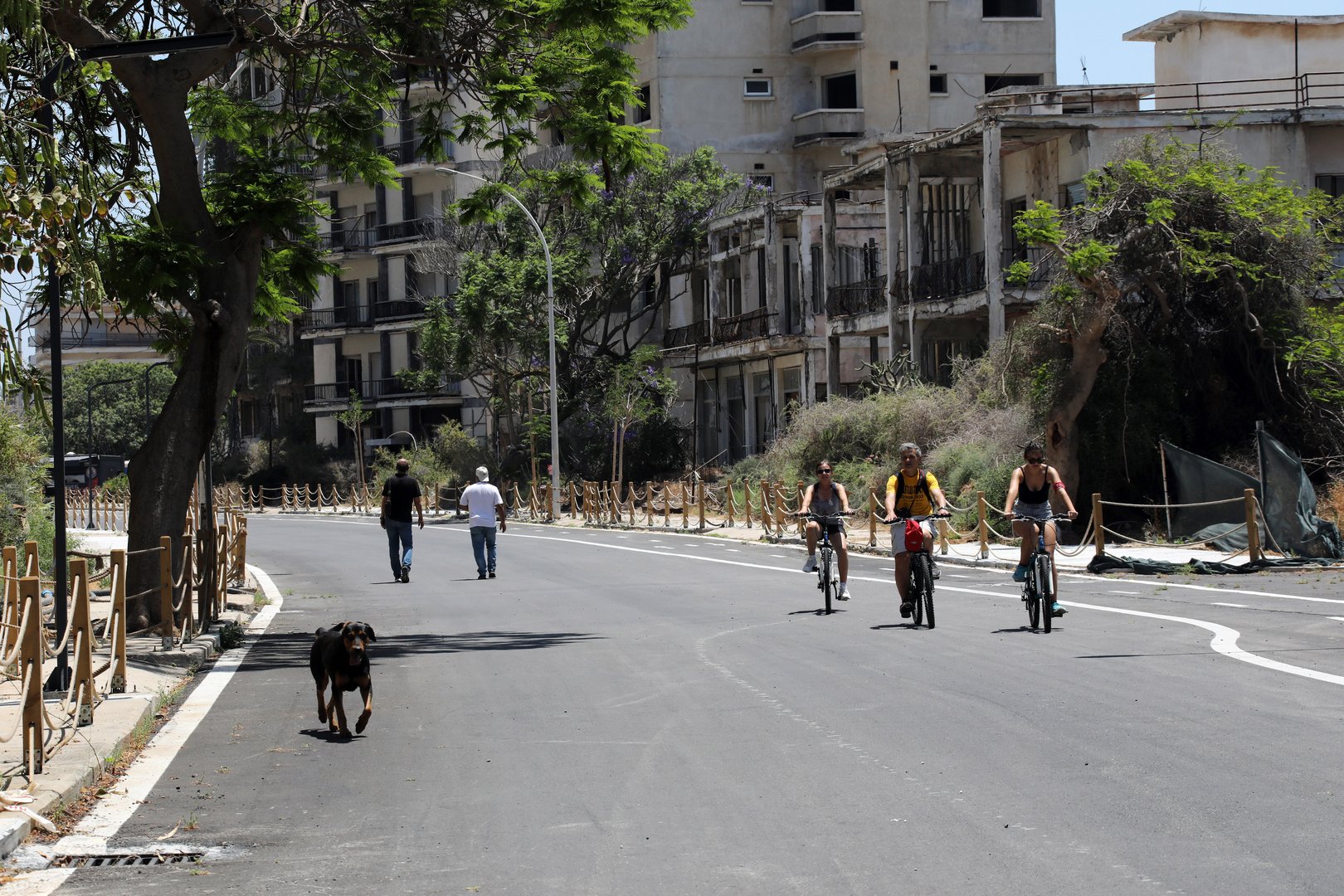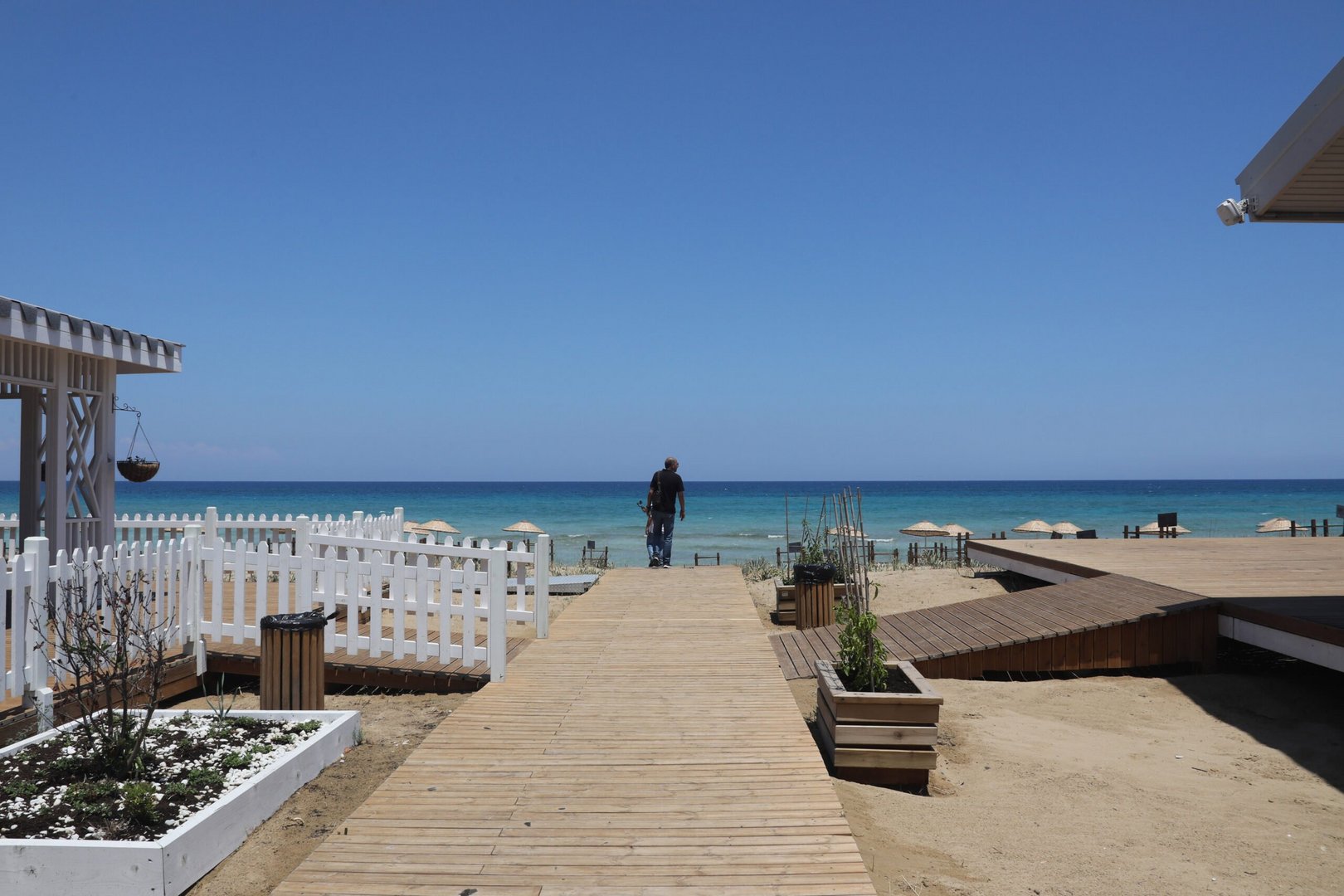By Evie Andreou
But for how much longer? The Turkish side has not yet touched Varosha properties, but time may be running out for Greek Cypriot property owners to stake their claims
Calls on Varosha refugees to register their claims on their properties have intensified as fears grow over what Turkey will do next with the fenced area of Famagusta.
With Varosha’s beaches spruced up and open for visitors last week, and following the ghost town’s partial reopening last year, it is being promoted by Turkish Cypriot authorities as a ‘dark tourism’ site. This macabre term is used for places of interest linked to death and suffering such as Chernobyl.
Turkish President Recep Tayyip Erdogan may also make announcements about Varosha during his visit to the north on July 20 to attend events marking the 47th anniversary of the Turkish invasion.
Just this week, Turkish Cypriot leader Ersin Tatar said that so far 344 people have laid claims over properties in Varosha through Turkey’s Immovable Property Commission (IPC). Tatar’s office said the north has paved the way for owners, including the Turkish Cypriot religious endowment foundation Evkaf, to seek remedies for their properties through the IPC.
The commission was set up by Turkey in 2005 as the domestic remedy – ranging from restitution of property, to compensation to exchange – for claims relating to Greek Cypriot properties in the north and was accepted as such by the European Court of Human Rights (ECHR) in 2010.
But the IPC’s effectiveness as a domestic remedy to property claims is part and parcel of the Varosha issue.
Just this week, Turkey submitted its observations on two cases for property claims in Varosha and Tymbou brought before the ECHR. The applicants are claiming that the IPC is an ineffective remedy for their property claims.
For advocate Achilleas Demetriades, who is handling these cases and several others, it does not seem that the IPC, despite its ineffectiveness, will cease being considered a domestic remedy.
“I think it’s very difficult to change, because Turkey is controlling the occupied areas,” he told the Cyprus Mail. That the IPC is not effective is quite easy to prove, he said, because there are so many drawbacks in the time that is needed to process the applications. Demetriades said that is why it was important to challenge the effectiveness of the IPC.
But challenging it means applying to it first and staking an ownership claim.
This means defying the Cyprus government which last year, citing legal advice, warned against mass applications to the IPC, arguing this would be to the detriment of the Cyprus problem. But it did not present any detailed opinion on the matter. The Famagusta municipality held the same line as the government.
Demetriades argues that instead of the government trying to stall applications to the IPC, it should actually be offering property owners legal aid to do so.
The IPC has “a shelf life”, he said, with its mandate expiring on December 21, 2021.
“So far since 2005, its mandate has been renewed, but I cannot tell you that it will be renewed again or that they may not exclude certain areas. If they do, their argument will be: ‘the IPC has been there for more than 15 years, you have failed to apply. So why are you now concerned that you have no remedy’.
“And that is why I am urging people to consider their position and especially for Varosha, apply to the IPC to claim restitution and loss of use from 1974 to-date,” he said.
Varosha refugee and activist Andreas Lordos, disillusioned by the state’s stand on the matter, also stresses the importance of people claiming their properties in case Turkey later treats the unclaimed property as abandoned and uses it in any way it sees fit.
He is optimistic they will be allowed to return under Turkish Cypriot administration. He puts this down to the calls by the Turkish side on refugees to return to their homes and that since there are no people currently using these properties, Turkey cannot refuse give them back if they are claimed by their owners.
Lordos, who is the founder of the Peaceful Return of Refugees Movement, a group that works for the return to Varosha, said they are still waiting to see a reasoned opinion by the government on why they should not claim restitution through the IPC.
“How is the Cyprus problem harmed by me going back to my property?” Lordos asked. On the contrary, he said, not to return to Varosha would lead to its Turkification.
Lordos expressed his disappointment over the lack of support by the government and the Famagusta municipality in the struggle of those who wish to return.
“Return has now become a personal decision,” he said.
Both Lordos and Demetriades stress the need for refugees to claim their properties through the IPC before it is too late.
An added complication to the Varosha property issue are ownership claims in the town by the Turkish Cypriot religious foundation, Evkaf.
Evkaf challenges the 1960 settlement when 1.5 million pounds sterling were given by the outgoing British colonial government in full and final settlement of all claims that the Turkish Cypriot community may have had to Evkaf properties.
According to academic and director of the Friedrich-Ebert-Stiftung Cyprus Office, professor Hubert Faustmann, Evkaf’s claims over Varosha properties was another “dodgy issue”.
He referred to a 2019 administrative court decision in the north that Greek Cypriot titles did indeed prevail over those of Evkaf’s.
“There’s all kinds of nonsense going around. Even their own institutions have shot it down, but they keep bringing it up,” Faustmann said.
Evkaf also lays claims to one of the two cases currently before the ECHR, concerning KV Mediterranean Tours’ claims over an apartment building it owns in Varosha.
Referring to the 2019 court decision, Demetriades said he wonders, “if the Greek Cypriot titles are going to prevail, how does Evkaf make an argument that it’s an interested party, when it has no interest in the land, other than this allegation that it has concocted lately?
“The Evkaf argument will be put to the test.”
But despite the Turkish side’s statements it would gradually restore the once bustling tourist resort to its former glory when they opened part of the fenced area last October to visitors, recent moves observed in the fenced area do not yet match its stated intentions.
Two more beaches have been opened to the public in the fenced area which now operates as a tourist attraction. People are allowed to visit certain parts on and near the coastal front on certain hours each day.
Turkish Cypriot ‘tourism minister’ Fikri Ataoglu said this week that Varosha, as a ‘dark tourism’ site, would contribute positively to the north’s tourism revenues.
Speaking to reporters during a visit to the newly opened section, Ataoglu said they were working to attract more tourists there. He said information pamphlets will soon be made available for visitors.
He added that Varosha will be the key part of tourism revenues this summer season.
Yet, activist and spokesperson of the Famagusta Initiative, Okan Dagli said the opening up of only public spaces is not what Tatar and Erdogan announced months ago.
“Unfortunately, the statements that the legal residents of Varosha would be allowed to return to their properties did not materialise,” he said, adding that applications to the IPC have not been processed yet.
He added that contradictory statements are still being made about what future awaits Varosha. “We are against the constant harassment of the legal residents of this city with such statements and expansions, and we do not find it right.”
For Faustmann, Turkey is employing the ‘salami tactic’, “like cutting a salami piece by piece, it is gradually making steps.”
“They have been very careful, they turned Varosha into a museum, they are very careful not to touch the properties,” he said.
If the Republic of Cyprus ever takes them to the international court, he said, though they already are in violation of international law as to the status of the fenced area which Ankara should give to the UN, they are not overstepping the right of Greek Cypriots to their properties.
“They have not crossed the red line yet.”
He added that opening beaches is a grey area, assuming there are no property rights on them or that they are not violated by not giving them to anybody else as property.
He also posed the question of restitution. Faustmann argued that for properties to be returned and used, there needs to be a civilian administration. The fenced area is still a military zone.
“Who is going to administer a revitalised Varosha?” He asked. “If it is not done by the UN then Turkey and the Turkish Cypriots will be violating UN resolutions and international law,” he said.
Dagli agreed that although Varosha should be removed from the military zone for this, such a step has not been taken yet.
“I think that the pressure of the international community may have played an important role in this, as well as the fact that the soldiers could not be removed from Varosha.”
But what Erdogan might say on July 20?
“It is speculated he might announce something on Varosha,” Faustmann said.
He added that both Turkey and the Turkish Cypriot leader, through these provocations and escalation of tension want to feed their nationalist constituencies.
“Erdogan wants to score nationalist points to boost his declining popularity in particular if he intends to hold early elections in Turkey.”
Any further steps on Varosha extending Turkish Cypriot administrative control over the area would mean confrontation with the international community and it remains to be seen if Erdogan will cross that line, he said.








Click here to change your cookie preferences